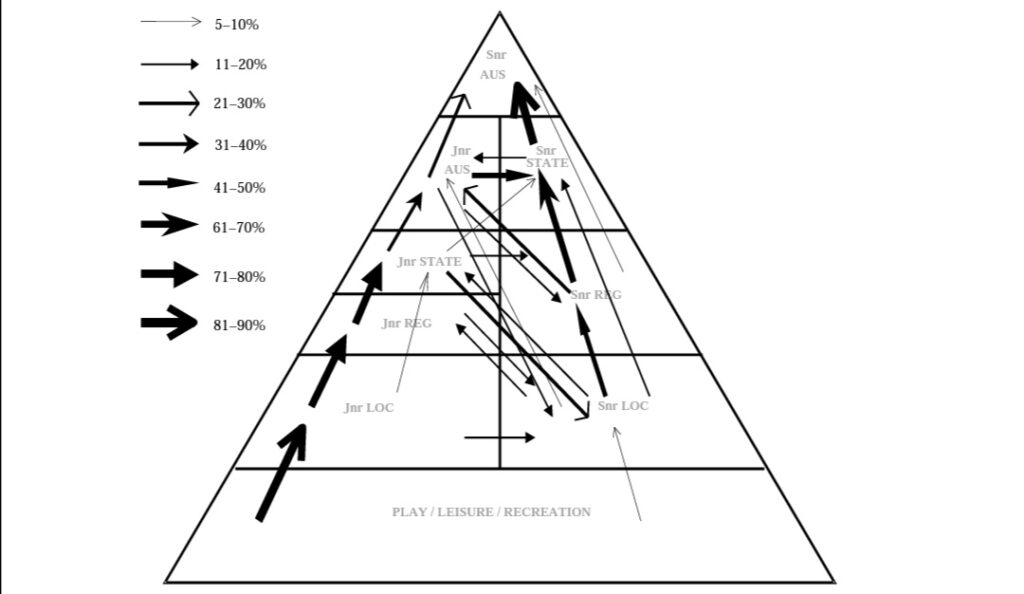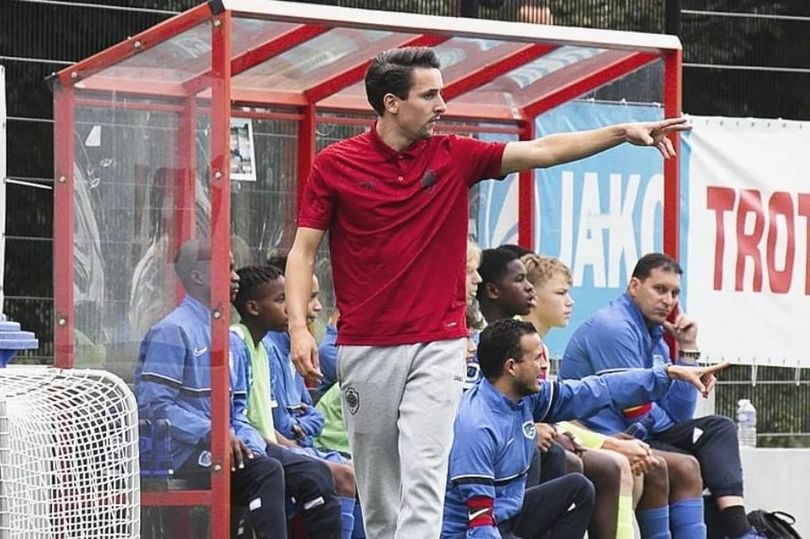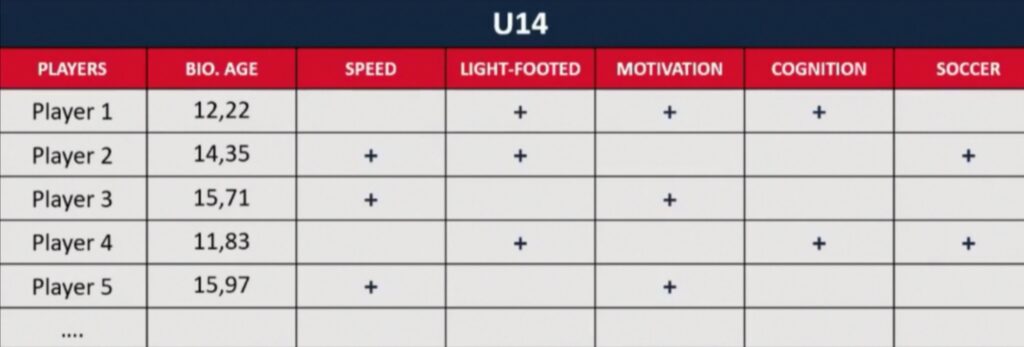It is an exciting time for Rangers. A new manager, new coaching staff and new ideas are being funnelled into the club as we move into a new era under Giovanni van Bronckhorst. Those new ideas that we are adopting as a club are not solely limited to First Team and Senior endeavours, although that is obviously the primary focus, the playing structure trickles down into Academy football to ensure that standards are consistently mirrored from youth to senior level.
Standards are one thing that Zeb Jacobs is keen to instil within younger players from their earliest developmental stages, but we will come on to that. The former Talent Coordinator at Royal Antwerp has today [Wednesday] been announced as the Head of Coaching within the Rangers Academy. Highly regarded as one of the best young coaches in Belgium, Jacobs will join Rangers in the new year and get to work on helping shape the future of Rangers players within the academy. But before the new era begins for the young bears, this seems like a good opportunity to detail exactly what we can expect from one of the games brightest students – from his background to his “Building Blocks for Potential” and his dislike for the word “talent”.
Jacobs in his younger days attended one of five elite soccer schools in Belgium, that focus on combining footballing and educational development, as well as playing for the Royal Antwerp youth side and the youth Belgian national team. After not turning professional due to injury, Jacobs studied children’s development and the impact that coaching has on that. He got his break in coaching when he was offered the role of coaching the U11s at KV Mechlen, who he had also played for at youth level. Jacobs has spoken highly of coaches that developed him throughout his time playing academy football and his desire to be like them when assisting young players. After gaining his role as Talent Coordinator at Royal Antwerp, Jacobs used the Covid-19 pandemic to develop his vision within football through reading and conversations with fellow coaches throughout Europe, as well as discussing skill development with an NBA skills coach to gain an insight into how other sports manage their development. Jacobs has stated before that it is his belief that players under the age of thirteen while being focused on football, need to try out other sports. This is for the specific requirement of improving a players movement at a young age, and playing different sports will teach the players different aspects of body movements which can then be translated into football.
He has said before that he has been heavily influenced by the academy at AZ Alkmaar in the Netherlands due to their high number of players that have broken through from the Academy into the first team. This is part of his personal goal to always “look into the mirror and out of the window” as he is always observing other coaches and other ways of working to try and incorporate it into his own academy structure. From a personal point of view, this is one of the most exciting aspects of Jacobs appointment – this is a coach who is going to be constantly importing new developmental ideas and methods of coaching from around Europe and beyond into the Rangers Academy. In relation to his interest in AZ Alkmaar, they are a club that Jacob feels are on the cusp of actually developing a formulaic approach to talent development based on statistical data that can accurately predict a players potential – allowing coaches a better understanding of what a players developmental needs are. For context, 50% of the AZ Alkmaar U13s became professional footballers whereas in England less than 1% of boys who enter academies at the age of 9 make it.
Jacobs was part of a total restructure of the Antwerp Academy in 2017. Working under a new Head of Development (the role that he has moved into at Rangers) they hired new coaches and new staff into the Academy. They also hired ex-professionals to work in the Academy as he described that there is a key relationship between “details and relationship builders” that allow for young players to develop at both a higher level and quicker pace. Part of that relationship building is working with the young players educators to ensure that there is a healthy balance struck between footballing and educational development. He does not believe in a “development culture” or a “performance culture” but believes that that one is born out of the other – you can be so focused on development that you lose sight of performance’s, and you can be so focused on performances that you can lose sight of development. He has a constant focus on how football will be played in a decade’s time and sees this as a key factor in the development programme of young players. For example, if a player comes into our academy now in 2021 aged ten years old, by the time that young player starts breaking into the first team and playing regularly in 2031, the game might have changed beyond recognition.
In terms of internal and external dynamics that have a direct influence on a young players development, Jacobs views the environment, intrapersonal factors and luck to be three of the biggest. From an environmental standpoint, Jacobs has stated (perhaps unsurprisingly) that young players who are brought up in supportive environments have a greater chance of making it to the professional level than those who do not, so he places a great level of emphasis on ensuring that he can create an environment where players of all backgrounds and homelives can thrive. The intrapersonal factors include such variables as the young players identity, motivation and beliefs, dealing with this is arguably one of the most important factors in talent development at that age. These are young children, teenagers and young men that will be coming through the Academy structure; a player’s identity, motivation and beliefs when playing for the U16s will be radically different to when they were playing for the U12s, for example. This is where Jacobs background in studying children’s development has come in particularly handy as it has given him a basis (along with his own personal experience of Academy football) to deal with those variables. Luck is the hardest to control but arguably the most important. This can be everything from a player receiving a bad injury at a crucial stage of their development or being given the right opportunity at the right time.
That aspect of luck is why he is keen to stress to young players that their own personal talent development is rarely going to be a linear progression without setbacks, describing it as a “marathon” that has many different staging posts with ups and downs throughout. As Jacobs states, only 16% of top performing players were high performers at the early stages of their development, whereas 84% of players develop themselves in a non-linear fashion. Academic research into the performance patterns of elite athletes supports this conclusion, with the academic talent development pyramid detailing a pattern of progression that is more akin to snakes and ladders rather than an upward escalator. This is an encouraging thing from the perspective of the Rangers Academy as stressing that non-linear progression for young players is a natural part of their development is key for their emotional wellbeing as they try and make it professional.

He considers there to be “Four Building Blocks of Potential” which are speed, light-footedness, motivation, and cognition. These tie in with the four most common attributes that coaches look for in players which are tactical, technical, mental, and physical. The motivational and mental side of the game is a natural attribute that Jacobs looks for in all young players, specifically how they recover from setbacks (this is aligned with non-linear development) along with players who can handle the pressure of playing at big clubs (again, perfect for Rangers). The cognitive block is Jacobs interesting adaptation on the requirement for tactical attributes. For this building block, Jacob wants to see players be able to adapt their play and decision making based on their environment on the pitch. I think from a Rangers perspective this is the single most important block when it comes to developing players in the hope that they reach the first team. Looking at the B Team specifically as they are the final stage of the Rangers Academy, they are facing different challenges on a regular basis whether that is coming from European opposition or low blocks in the Lowland league against fully developed men, the ability to make in-game decisions and execute them accordingly is one of the most vital skills any player can posses and will be one of the key factors in their ability to turn professional or not.
The cognition aspect feeds into everything else and can display where players can further develop. An example that Jacobs has used in the past is if a player is getting into good positions but then losing 1v1s against their opponent by being muscled off the ball, it shows that the players’ cognition is sound, but he needs to develop physically. Alternatively, if a player is physically developed but makes a lot of rash challenges on the pitch then it shows they need cognitive development. One drill that Jacobs employed at Antwerp was to set three players out within a rectangle, with goals on each corner. With one attacker and two defenders on either side, the ball was played in and the attacker was made to try and find a way to score into one of the goals. This drill was used to try and teach players how to make quick decisions in tight spaces, improving them both technically and cognitively. You can watch a clip of that drill in action by clicking the link below.
In order to measure this, Jacobs used a metric that combines the players’ biological age with the building blocks to determine the long-term potential of players. This can be seen below. When the results are in after testing, they focus on the strengths of the players and then use that as a basis for talent selection moving forward.
Despite his title at Antwerp, Jacobs does not like the word “talent”, having described it as a “very ugly word”. He believes that players who believe in talent lose their motivation because they believe that having the right genetics will carry them through to professional level. It also has a detrimental effect on the players around them as it implies that they do not have the right genetics and therefore has a detrimental impact on their motivation. He prefers the word “potential”, which as a word implies that any success the player has had up to this point has come from their hard work, therefore, encouraging them (and those around them) to do more hard work. He defines potential as “the ability to develop a skill to an exceptionally high level” – again emphasising to players the need for hard work in order to reach that high level.
Overall, there is a lot to feel encouraged about with regards to the appointment of Zeb Jacobs as the Academies new Head of Coaching. The Academy is already doing some fantastic work at youth level to be able to prepare the youngsters for the next stages of their career but introducing Jacobs into the equation with his expert knowledge of Academies across Europe will give us a hugely different dimension. One thing to keep an eye on I would say is the relationship he will have with our new Assistant Manager Dave Vos, who has arrived himself of course from spending a decade at the famed Ajax academy. The prospect of an academy that has a heavy European influence is one that I believe we should all find greatly exciting going forward and I am looking forward to seeing how Jacobs influences the academy structure going forward.
It’s fair to say it – the future is bright, the future is Belgian!
@HeartandHutts




